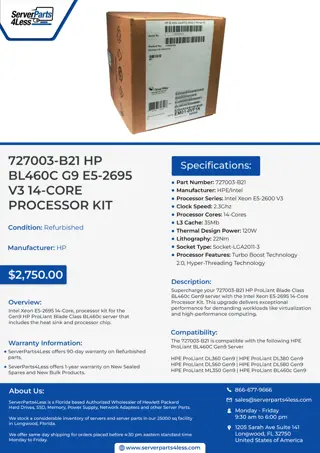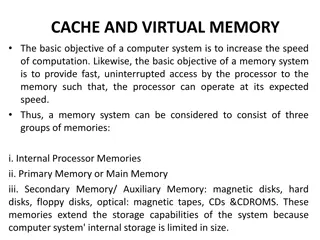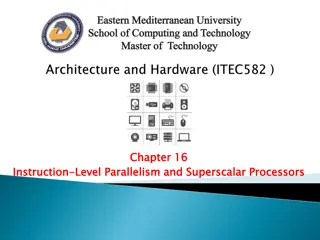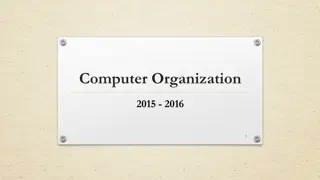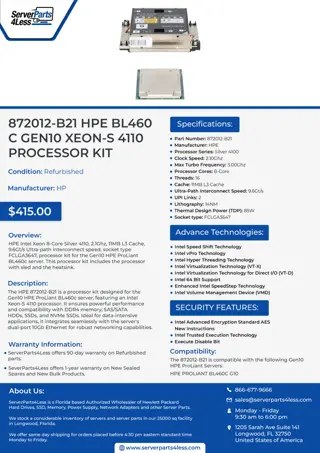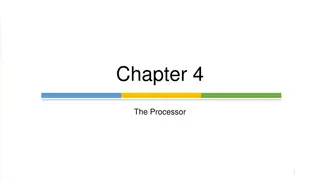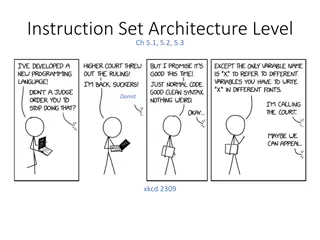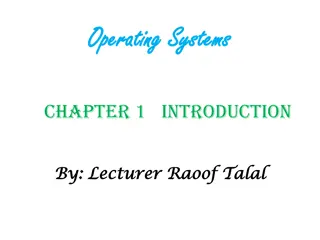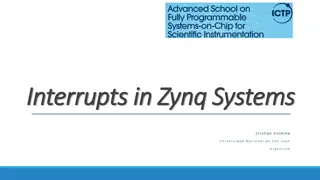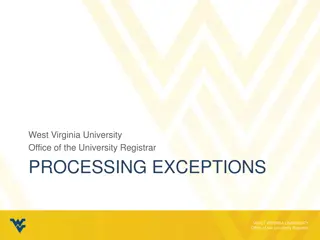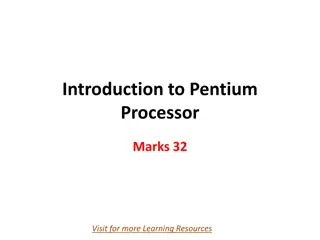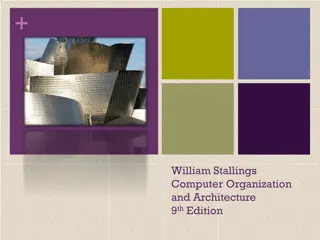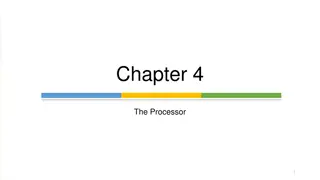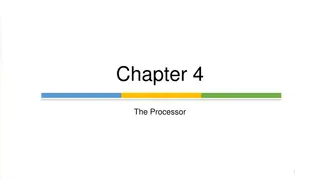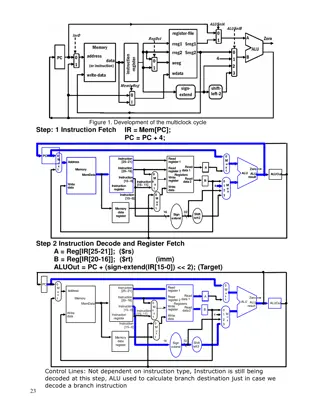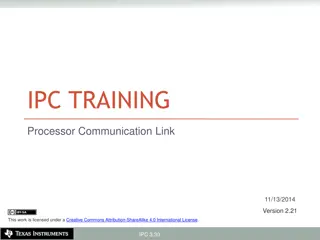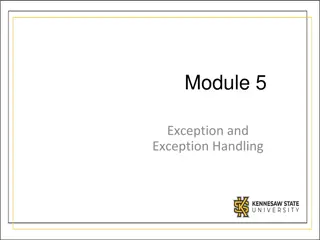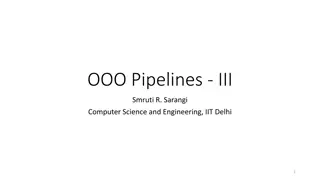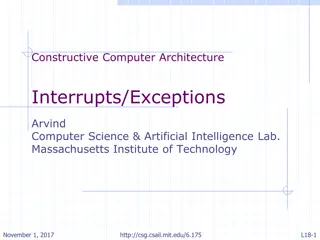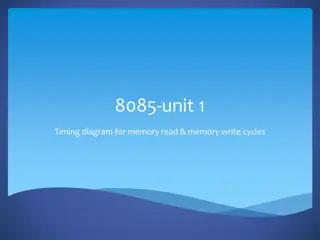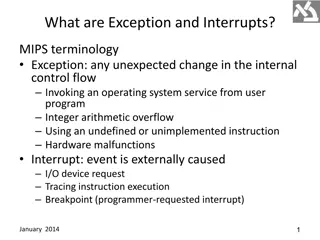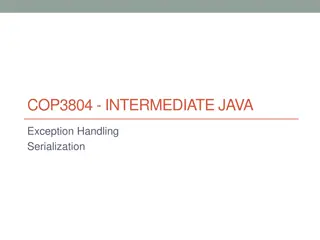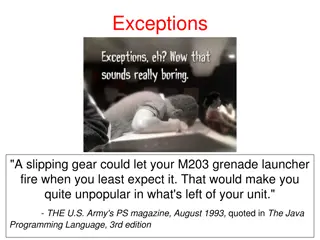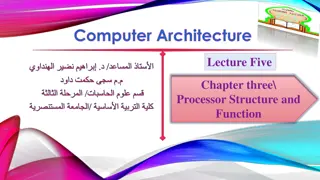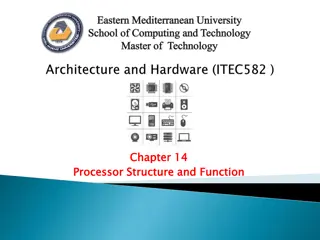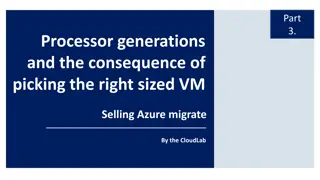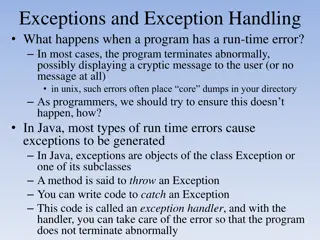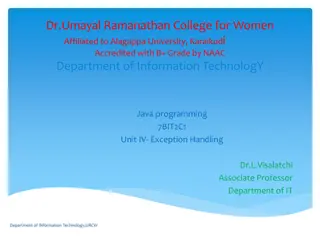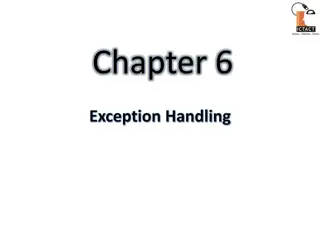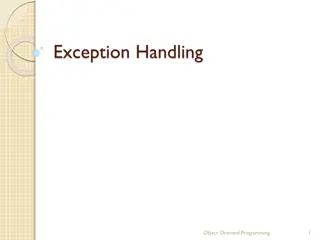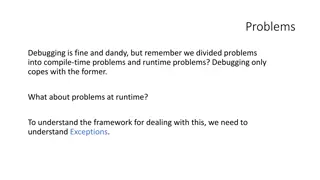727003-B21 HP BL460C G9 E5-2695 V3 14-CORE PROCESSOR KIT
Refurbished | HP 727003-B21 | BL460C G9 E5-2695 V3 14-CORE PROCESSOR KIT | \u2713 FREE and FAST Ground Shipping across the U.S. | Best Price Guaranteed\n\n\/\/ \/727003-b21-hp-bl460c-g9-e5-2695-v3-14-core-processor-kit\/
0 views • 1 slides
Understanding Cache and Virtual Memory in Computer Systems
A computer's memory system is crucial for ensuring fast and uninterrupted access to data by the processor. This system comprises internal processor memories, primary memory, and secondary memory such as hard drives. The utilization of cache memory helps bridge the speed gap between the CPU and main
1 views • 47 slides
Understanding Superscalar Processors in Processor Design
Explore the concept of superscalar processors in processor design, including the ability to execute instructions independently and concurrently. Learn about the difference between superscalar and superpipelined approaches, instruction-level parallelism, and the limitations and design issues involved
0 views • 55 slides
Understanding Basic Input/Output Operations in Computer Organization
Basic Input/Output Operations are essential functions in computer systems that involve transferring data between processors and external devices like keyboards and displays. This task requires synchronization mechanisms due to differences in processing speeds. The process involves reading characters
0 views • 11 slides
Buy 872012-B21 HPE BL460C GEN10 XEON-S 4110 PROCESSOR KIT
Refurbished | HPE 872012-B21 | BL460C GEN10 XEON-S 4110 PROCESSOR KIT | \u2713 FREE and FAST Ground Shipping across the U.S. | Best Price Guaranteed\n\n\/\/ \/872012-b21-hpe-bl460c-gen10-xeon-s-4110-processor-kit\/
0 views • 1 slides
Processor Control Unit and ALU Implementation Overview
In Chapter 4, the processor's control unit and ALU are detailed in a simple implementation scheme. The ALU performs operations based on opcode values, while the control unit provides signals for various functions such as load/store, compare, and branch. Decoding techniques and control signal generat
1 views • 21 slides
Understanding Common Invoice Exceptions in Guided Buying
In guided buying, invoice exceptions play a critical role. Learn about common invoice exceptions such as price variances, quantity discrepancies, and auto-reject scenarios. Discover how to handle these exceptions effectively to ensure smooth procurement processes.
0 views • 8 slides
Understanding Instruction Set Architecture and Data Types in Computer Systems
In computer architecture, the Instruction Set Architecture (ISA) level is crucial in defining how a processor executes instructions. This includes the formal defining documents, memory models, registers, and various data types that can be supported. The ISA level specifies the capabilities of a proc
2 views • 13 slides
Understanding Computer System Architectures
Computer systems can be categorized into single-processor and multiprocessor systems. Single-processor systems have one main CPU but may also contain special-purpose processors. Multiprocessor systems have multiple processors that share resources, offering advantages like increased throughput, econo
2 views • 25 slides
Techniques for Reducing Connected-Standby Energy Consumption in Mobile Devices
Mobile devices spend a significant amount of time in connected-standby mode, leading to energy inefficiency in the Deepest-Runtime-Idle-Power State (DRIPS). This study introduces Optimized DRIPS (ODRIPS) to address this issue by offloading wake-up timer events, powering off IO signals, and transferr
1 views • 31 slides
Understanding Processor Interrupts and Exception Handling in Zynq Systems
Learn about interrupts, exceptions, and their handling in Zynq Systems. Explore concepts like interrupt sources, Cortex-A9 processor interrupts, interrupt terminology, and the difference between pooling and hardware interrupts. Gain insights into interrupt service routines, interrupt pins, interrupt
0 views • 60 slides
Managing Exceptions in West Virginia University Office of the University Registrar
West Virginia University's Office of the University Registrar processes exceptions through Degree Works, allowing advisors to make edits on a case-by-case basis. Understanding exception types like Force Complete and Substitute is crucial for properly managing student records to ensure accurate acade
3 views • 14 slides
In-Depth Look at Pentium Processor Features
Explore the advanced features of the Pentium processor, including separate instruction and data caches, dual integer pipelines, superscalar execution, support for multitasking, and more. Learn about its 32-bit architecture, power management capabilities, internal error detection features, and the ef
0 views • 24 slides
Trends in Computer Organization and Architecture
This content delves into various aspects of computer organization and architecture, covering topics such as multicore computers, alternative chip organization, Intel hardware trends, processor trends, power consumption projections, and performance effects of multiple cores. It also discusses the sca
5 views • 28 slides
Understanding Processor Speculation and Optimization
Dive into the world of processor speculation techniques and optimizations, including compiler and hardware support for speculative execution. Explore how speculation can enhance performance by guessing instruction outcomes and rolling back if needed. Learn about static and dynamic speculation, handl
0 views • 33 slides
Understanding Pipelined Control in Processor Architecture
Explore the intricacies of pipelined control in processor design, detailing the control signals required at each stage of the pipeline. Learn about data hazards, forwarding, and stalling techniques to ensure efficient instruction execution. Dive into the concept of optimized control values for strea
0 views • 16 slides
Understanding Hearsay Exceptions for Children in Legal Proceedings
Exploration of hearsay exceptions for children in legal contexts, including how out-of-court statements are considered, the importance of minimizing emotional trauma for children, and specific cases illustrating the application of special exceptions in child abuse situations.
1 views • 22 slides
Development of Multiclock Cycle in Processor
The development process of the multiclock cycle in a processor is explained in detail through different steps, including instruction fetch, decode, register fetch, execution, and write-back for R-type instructions. Control lines and branching execution are also covered in the description. The conten
0 views • 5 slides
Overview of Inter-Processor Communication (IPC) in Processor Communication Link
Overview of Inter-Processor Communication (IPC) entails communication between processors, synchronization methods, and supported device types. The IPC architecture supports diverse use cases with various thread combinations and messaging types, catering to multi- or uni-processor environments. The A
0 views • 110 slides
Understanding Hearsay Rules and Exceptions in Legal Proceedings
Hearsay evidence, which is an out-of-court statement introduced for the truth of its content, is considered less reliable in court due to factors like lack of oath, inability to see demeanour of declarant, and absence of cross-examination. Various historical judgments and legal exceptions allow cert
0 views • 90 slides
Understanding Exceptions in Degree Works
The exceptions in Degree Works allow for modifications to academic requirements, such as for completing rules, substituting courses, adding new course options, and applying specific courses to rules. These exceptions provide flexibility while ensuring academic standards are upheld. However, caution
0 views • 24 slides
Understanding Exceptions in Degree Works
Dive into the various exception types in Degree Works, such as Force Complete, Substitute, Also Allow, and Apply Here. Explore how these exceptions impact course requirements, credits, and student data, with caution advised for using the powerful Force Complete option. Learn about the flexibility an
0 views • 25 slides
Understanding Exception Handling in Java
Exception handling in Java is essential for dealing with potential problems that may arise during program execution. By implementing try-catch-finally blocks and throwing custom exceptions, developers can create more robust and secure applications. This article explores the basics of exceptions, the
0 views • 36 slides
Exception Handling in PL/SQL
Learn about handling exceptions in PL/SQL, understanding the block structure, different types of exceptions including system, named, unnamed, and user-defined exceptions. Explore how to explicitly handle exceptions in PL/SQL blocks with examples showcasing error handling scenarios like division by z
0 views • 18 slides
Out-of-Order Processor Design Exploration
Explore the design of an Out-of-Order (OOO) processor with an architectural register file, aggressive speculation, and efficient replay mechanisms. Understand the changes to renaming, dispatch, wakeup, bypassing, register writes, and commit stages. Compare Processor Register File (PRF) based design
0 views • 29 slides
Understanding Computer Architecture Interrupts and Exceptions
Computer architecture interrupts and exceptions are essential for handling external events and unexpected conditions during program execution. Interrupts are caused by external events such as I/O requests, timers, or hardware failures, while exceptions occur due to specific instruction executions. W
0 views • 19 slides
Understanding Processor Cycles and Machine Cycles in 8085 Microprocessor
Processor cycles in microprocessors like 8085 involve executing instructions through machine cycles that are essential operations performed by the processor. In the 8085 microprocessor, there are seven basic machine cycles, each serving a specific purpose such as fetching opcodes, reading from memor
0 views • 17 slides
Exception Handling and Interrupts in MIPS Architectures
Exception and interrupts in MIPS play a crucial role in handling unexpected events and external requests efficiently. Exceptions include changes in control flow, arithmetic overflows, and hardware malfunctions, while interrupts are externally caused events like I/O requests. When an exception occurs
0 views • 29 slides
Understanding Exception Handling in Intermediate Java
Exception handling is crucial in Java programming to manage errors and unexpected events that can disrupt program execution. This article covers the basics of exceptions, throwing and handling exceptions, types of exceptions (checked and unchecked), and use of try, catch, and finally blocks. Learn h
0 views • 11 slides
Handling Exceptions in Java Programming
Problems can arise during program execution, ranging from user input errors to device failures and code errors. It is essential to handle these exceptions effectively to ensure the stability and reliability of the program. In Java, exceptions are represented as objects and categorized into different
0 views • 41 slides
Understanding Processor Organization in Computer Architecture
Processor organization involves key tasks such as fetching instructions, interpreting instructions, processing data, and storing temporary data. The CPU consists of components like the ALU, control unit, and registers. Register organization plays a crucial role in optimizing memory usage and control
0 views • 21 slides
Understanding Processor Structure and Function in Computing
Explore the key components and functions of processors in computing, including user-visible and control status registers, instruction cycle, instruction pipelining, processor tasks like data processing and instruction interpretation, and the roles of arithmetic and logic units and control units. Lea
0 views • 61 slides
Understanding Processor Generations and VM Sizing for Azure Migration
Exploring the impact of processor generations on CPU performance, factors like clock speed, instruction set, and cache size are crucial. Choosing the right-sized VM plays a vital role in optimizing Azure migration. Passmark CPU Benchmark results provide insights on Intel processor generations for Az
0 views • 9 slides
Understanding Java Exception Handling
Java provides a way to handle run-time errors through exceptions, which are objects of the class Exception or its subclasses. By using exception handlers, programmers can catch and manage exceptions to prevent abnormal termination of the program. Java's exception hierarchy includes Throwable, which
0 views • 29 slides
Exception Handling in Java: Basics, Examples, and Importance
Understanding the concept of exception handling in Java, including what exceptions are, the difference between errors and exceptions, reasons for exceptions, how to handle them, and the advantages of exception handling. This topic covers the basics of handling runtime errors in Java programming and
0 views • 27 slides
Understanding Exception Handling in Java
Exception handling in Java is a crucial mechanism to manage runtime errors effectively. This article explains the concept of exceptions, advantages of using exception handling, types of exceptions (checked, unchecked, and errors), common scenarios like ArithmeticException and NullPointerException, a
0 views • 23 slides
Exception Handling in Java: Understanding Errors and Exceptions
Exception handling in Java is crucial for dealing with errors and exceptions that can occur during program execution. Errors and exceptions are conditions that disrupt the normal flow of a program, and understanding their differences is key to effective error management. This chapter covers the conc
0 views • 32 slides
Understanding Exception Handling in Object-Oriented Programming
Exception handling in object-oriented programming enables a program to manage and recover from exceptional situations during runtime errors. Java uses exceptions to represent errors, allowing methods to throw exceptions that can be caught and handled by the caller, thus separating error detection an
0 views • 21 slides
Understanding Exception Handling in C#
Exceptions in programming are runtime errors that can disrupt program execution if not handled properly. In C#, exceptions are represented by objects of the System.Exception class or its subclasses. Exception handling involves using keywords like try, catch, throw, and finally to manage errors and e
0 views • 37 slides
Understanding Python Exceptions for Handling Runtime Problems
Exceptions in Python are essential for handling runtime problems and preventing programs from crashing unexpectedly. By using try-except blocks, developers can catch and manage exceptions that occur during program execution, ensuring smooth functioning. Learn how to effectively utilize exceptions to
0 views • 15 slides
